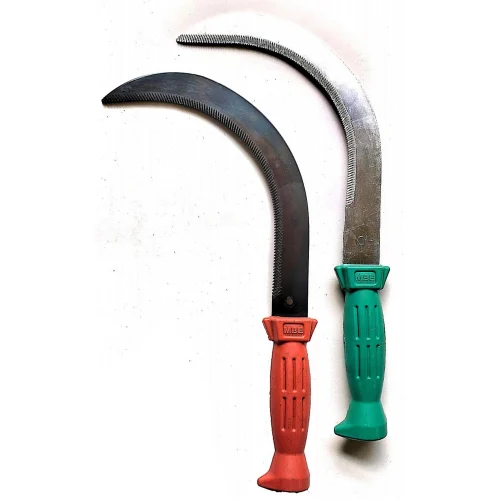Red PVC Handle Carbon Steel Hand Sickle
₹30.0
| Usage/Application | Agriculture |
| Brand | MBE |
| Model Name/Number | 5 |
| Material | PVC (Handle) |
| Size | 12 Inch ( Length) |
| Color | Red |
| Blade Thickness | 1.5 mm |
| Blade Material | Carbon Steel |
- Description
- Additional information
- Reviews (0)
- Q & A
- Sustainability Remark
- More Offers
- Store Policies
- Inquiries
We V.V Manufacturer based in Rajkot Gujarat are Leading Manufacturer & Supplier of PVC / Plastic Agriculture Hand Sickel & Wooden Agriculture Hand Sickle and We can Supply All Over in India.
| brands | MBE |
|---|
You must be logged in to post a review.
Q & A
Harvest management tools, when used effectively, can contribute to sustainability in agriculture in several ways. These tools assist farmers in optimizing harvest activities, improving efficiency, reducing waste, and minimizing environmental impacts. Here are some ways in which harvest management tools promote sustainability:
Efficient resource allocation: Harvest management tools provide farmers with data and insights to optimize the allocation of resources such as labor, machinery, and storage facilities. By accurately predicting harvest timing and yield, farmers can plan and schedule activities more efficiently, minimizing unnecessary resource use and associated environmental impacts.
Minimized food waste: Accurate harvest management tools help farmers determine the optimal time for harvesting crops, reducing the risk of premature or delayed harvests. This precision ensures that crops are harvested at their peak quality and nutritional value, reducing post-harvest losses and food waste.
Enhanced product quality: Harvest management tools aid in assessing crop maturity and quality parameters, allowing farmers to make informed decisions about the ideal time for harvest. By harvesting crops at their optimal stage, farmers can deliver higher-quality produce to the market, reducing the need for post-harvest treatments and enhancing consumer satisfaction.
Reduced environmental impact: Effective harvest management tools enable farmers to minimize the use of chemical inputs, such as pesticides and fertilizers. By accurately timing harvests, farmers can avoid applying unnecessary chemicals, reducing the risk of environmental contamination and improving ecological balance.
Energy conservation: Harvest management tools assist farmers in optimizing energy use during the harvest process. This includes efficient scheduling of machinery operations, optimizing fuel consumption, and reducing greenhouse gas emissions associated with harvest activities.
Crop rotation and cover cropping: Some harvest management tools provide insights into crop rotation and cover cropping strategies. These practices enhance soil health, reduce soil erosion, increase nutrient availability, and minimize the risk of pests and diseases. By implementing appropriate crop rotation and cover cropping plans, farmers can improve sustainability and long-term productivity.
It is important to note that the sustainability of harvest management tools also depends on their proper use, maintenance, and integration with other agricultural practices. Additionally, accessibility and affordability of these tools to small-scale farmers are crucial for widespread adoption and equitable sustainability benefits in agriculture.
General Inquiries
There are no inquiries yet.



















Reviews
There are no reviews yet.